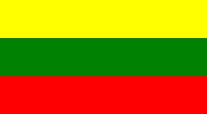 |
Number of versions: 3
Edition: September 25, 2001
Updated: March 30, 2009
|

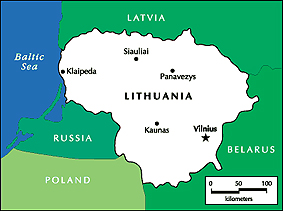 As far as known
only one inland made monopoly-like game has ever been made and the
Parker/Hasbro Monopoly edition is not introduced in this country until 2001. Of course the
streets and stations are here of the capital Vilnius. As far as known
only one inland made monopoly-like game has ever been made and the
Parker/Hasbro Monopoly edition is not introduced in this country until 2001. Of course the
streets and stations are here of the capital Vilnius.
Already a few years later, in 2007, Ralph Anspach's Anti-Monopoly was
launched in this country as well.
From Eik onwards all fields are:
Kirtimu gatve - Visuomenes fondas (Community
Chest) - Gariunu gatve - Pajamu
Mokestis (Income tax) - Siauliu Gelezinkelio Stotis
(Station) - Latviu gatve -
Sansas - Vytauto
gatve - Kestucio
gatve - Lukiskiu
Kalejimas/Esi Tik Lankytojas (In Jail/Just visiting) - Kauno
gatve - Elektros Tinklai - Svitrigailos
gatve - Dariaus
Ir
Gireno gatve - Klaipedos Gelezinkelio Stotis - Pylimo
gatve - Visuomenes fondas - J.Basanaviciaus
gatve - Savanoriu prospektas - Nemokama
Stovejimo Aikstele (Free Parking) - Zirmunu
gatve - Sansas - Antakalnio
gatve
- A. Gostauto gatve - Kauno gelezinkelio Stotis
- Kalvariju
gatve - Laisves
Prospektas - Vandentiekis (Water Works) -
Ukmerges
gatve - Eik! Kalejima (Go to Jail) - Pilies
gatve - Vokieciu gatve -
Visuomenes fondas - Vilniaus gatve - Vilniaus
gelezinkelio Stotis - Sansas - Didzioji gatve
- Turto Mokestis and Gedimino Prospektas.
 Edition:
Monopolis Edition:
Monopolis
Publisher: Unknown inland manufacturer - ±1989
Dimensions of the box: 17.0 x 33.0 cm
of the game board: 31.5 x 31.5 cm
The game:
The previous
Lithuanian owner of this set
gave following explanation to this bilingual game:
"The game was made in Lithuania when
my country was part of the Soviet Union, like the other Baltic states. At
that time we were obliged to learn and speak Russian, because it was the
official state language. We
have been occupied by the Russians from 1944
until we proclaimed the renewed Lithuanian independance March 1990.
However, the independency was not recognized by Russia until September
1991, soon followed by many other countries.
Just before the end of Soviet Union, politics became softer and allowed
more things from the western culture like this game for example. Such things became
popular among people, but the rule that everything had to be written in Russian
remained, that's why this game's Rules are written in Russian."
The yellow
lid of the game box only show the "shareholder cards" as well as some of the
little "Chance cards".
Each side of the little game board has 3 company spaces, 1 railwaystation
and a "destiny" space (showing a yellow
circle with some image).
The 23 spaces on the board are from 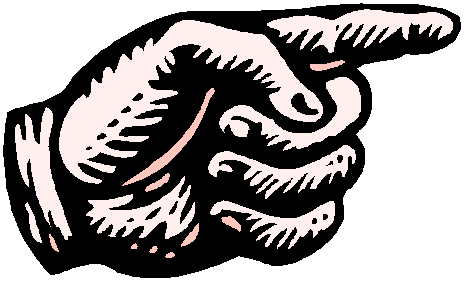 onwards:
onwards:
Pepsi-Cola -10%-circle - Marlboro - Knďb (Kiev)
- Las Vegas - a Jail
corner - Philips - policeman in circle - Opel - Alma-Ata - Ford -
cowboy on totem pole (Destiny corner) - Parker - sun and cube in circle - Toyota - New
York - Asahi - judge corner - Atlantic - sun and cube in circle -
Honda - London and Panam.
The instruction on
the destiny spaces respectively reads:
 |
side 1:
pay 10% of your funds and put it in the "destiny pool". |
 |
side 2
with the policeman: pay
a fine of 500 and put it in the "pool". |
 |
side 3
and 4: test your luck by taking a Chance card. |
It is remarkable to see that the "Destiny corner" is officially
used as the "Free Parking corner" in the unofficial family
rules in Parker Brother editions!
Besides, there is an inner circle in the centre of the game board, called
Klondike, being an essential part of the game. Klondike can be entered
any moment, by paying the Bank 500. Starting point is the pointing hand as in
the main part of the game. The Rules for this section are as follows:
 |
Landing on each of the empty yellow
spaces player receives 1000 from the Bank. |
 |
Landing on the space with the gold coin player receives
5000 and the right to return to the main game. |
 |
Landing on the space with the money bag player
receives 10000 and the right to return to the main game. |
 |
Landing on the space with the pistol player loses all
his money received in Klondike and has no right to leave the Klondike. |
 | Landing
on the space with the black cat player loses all
his money received in Klondike and must
return one of his most precious shareholder cards to the Bank as well as one
of the cheapest he owns, but he still has the right to return to the main
game. |
 |
Landing
on the space with the pointing hand player must return
to the main game with the money he collected in Klondike.
|
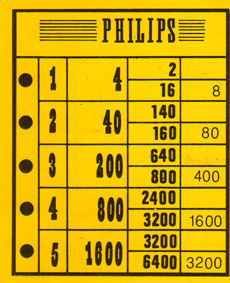 Instead
of property deeds players receive a shareholder card from the banker the moment
they buy shares of a property or station. Instead
of property deeds players receive a shareholder card from the banker the moment
they buy shares of a property or station.
How does that works? Let us take the
Philips property to explain:
-
The first
share, together with the "shareholders card" (like a "property
deed" in Parker Bros. Monopoly) can be bought for 16 the moment
you land on this free space. A
next player landing on this space have to pay you 4 .
When you are short
of cash you can pawn this card with the Bank for 8.
-
A second
share can be bought from the Bank for 160 after which a visitor must
pay you 40. The value of this share
however is 140. In order to remember how many shares you own on this
property you place the blue plastic
paperclip on line 2.
-
By this
way one can collect up to 5 shares by finally paying 6400. That
moment the value of your total shares is 3200 and any visitor has to
pay you 1600 each time he lands on this property. Should you run out of cash
you can pawn this card with the Bank for 3200.
There are 18
small (56x69 mm) yellow
Chance cards, to be placed on
the red dot in the centre of the board.
Some of the instructions on these Chance cards read:
 |
Konkurentu dovana gangsteriui 1000$ = Player receives
1000 from each other player and he gets the right to throw the dice 3
times.
In addition he is allowed to rob another player, f.e. the
moment he lands on a space owned by another player the owner must hand
over all profit to this player. |
 |
Nenumatytos pajamos 50% = Player receives 50% of his own
properties (stocks and stations) from the Bank. |
 |
Mafija 1000 $ = Player has to proceed to the Destiny
corner and pay 1000 fine. |
 |
Air Mail = Player does not move per space but per
board side. On doing so he is allowed to land on a space he likes,
except on the corner spaces. However, he does receive 200 passing the Start
corner. |
 |
Black cat = Player must return one of his
shareholder cards to the Bank, without the right to redeem it. |
The procedure with the stations is somewhat different:
When buying a station player has to pay 800 to the Bank and in the same time he
receives a hexagonal, plastic chip. The more stations a player owns the bigger
profit he gets. The moment another player lands on your station he owes you 200
per station. Should an owner runs out of cash he can, like with the other
properties, pawn a station with the Bank for 400 with the opportunity to
redeem the station when he has enough money again.
The money consists of rather a number of plastic coins in various
colors and diameters. The 11 denominations are: 1 -
2 - 5 (white) - 10 (white) - 20
- 50 - 100
- 500 - 1000 - 5000 and 15000.
There are 8 plastic tokens consisting of 6 hollow pawns and 2 little thimbles,
but they may not all belong to the game?
And so there are 6 dice going with this set, 3 black ones and 2 purple
ones, but I doubt they all belong to the game.
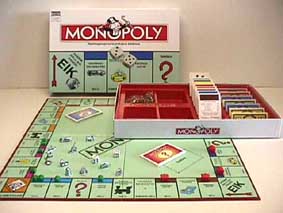 Edition:
Standard, ref. 030114535633 Edition:
Standard, ref. 030114535633
Publisher: Parker/Hasbro Inc./TÜB "Voira"-Kaunas - 2001
Dimensions of the box: 26,8 x 40,3 x 5,3 cm
of the folded game board:
25,2 x 25,2 cm
The game:
In the second half of the nineties Parker/Hasbro have introduced this capitalist game with great energy in many countries of the former Eastbloc.
And this introduction was strongly continued, because in March 2001 this game
was for the first time also marketed in the Baltic state of Lithuania. It was
brought with a certain pride, shown by the sticker on the protecting
foil.
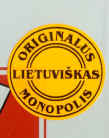 In
this for the rest of Europe so well-known "standard" box is of course
the red plastic "banker's
tray" with holes for the 7 banknotes and property deeds still present with
the banker. In
this for the rest of Europe so well-known "standard" box is of course
the red plastic "banker's
tray" with holes for the 7 banknotes and property deeds still present with
the banker.
The game board is folded in four and fits, when stored,
precisely on the banker's tray. The back of the board is as usual red,
the playside is blue green. This
edition is of course also manufactured in Ireland and therefore it shows the
picture of the "laughing family" at the bottom of the box.
On the game board the Sansas cards with nice red
back are as usual near the Start corner while the
Visuomenes fondas cards with their nice blue
back are near the Free Parking corner.
The banknotes are of the one-sided printed new model, i.e. with
a black Monopoly ribbon and Uncle Pennybags in the upper part of the
circle and, almost invisible, the remark "1996 Tonka Corporation",
(ref.1004535 OOC). The
currency is Lt
(Litas) and the denominations are resp.: 1
- 5 - 10
- 20 - 50
- 100 and 500.
The 10 tokens are of light metal and are the well-known: hat -
shoe - car - boat - dog - wheelbarrow - rider-on-a-horse - thimble - iron and
canon.
The green houses
and red hotels
are of non-transparant plastic and all have an overhanging roof with excentric chimney.
Both dice are white with black pips.
The price
of this set amounted to 79 Lt (€ 23,20) in July 2001 in a toyshop in the
Gedimino Prospektas (!).
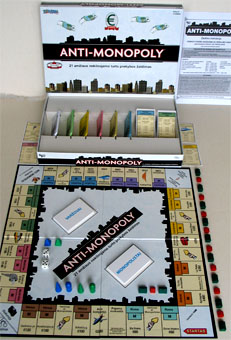 Edition: Anti-Monopoly®, Ref. 1777 Edition: Anti-Monopoly®, Ref. 1777
"21
amžiaus
nekilnojamo turto prekybos žaidimas"
Publisher:Kadabra-Kaunas-LT/University Games-NL - 2007
Dimensions of the box: 26.8 x 40.2 cm
The game:
On the bottom of the box is, next to a color picture of the game, a short explanation of the origin of the game and
how to play it.
The translation reads:
"An update of the "monopoly" folk game invented by Elizabeth Magie a 100 years ago. A twist right out of
today's headlines: free market competitors clash with ruthless monopolists.
In the real business world, competitors and monopolists work
hard to increase their incomes - but they go about it in different ways.
Competitors sell more goods at a fair price to make a fair profit. Monopolists,
on the other hand, destroy their competitors first so that they can fix prices
above fair, competitive levels to make excessive profits.
Other real estate trading games are a jumble of competition and monopolism. In Anti-Monopoly®, however, players are diveded into two
groups: competitors and monopolists before the game starts. The players follow
different rules (depending on their status) in their quest for big money. This
method of play is a revolutionary idea for games. In all other games players
follow one set of rules. It is this idea of movement and choice which allows Anti-Monopoly®
to be the first and only game in history which clearly distinguishes between the
actions of competitors and monopolists."
Ralph Anspach is a Professor Emeritus of Economics
at San Francisco State University who invented this Anti-Monopoly game. He based
his creation on the monopoly folkgame which was invented by
Elizabeth Magie in 1904 and was played extensively in the Eastern United States
between 1904 and 1935. Players in the monopoly folkgame buy and trade properties
to monopolize color groupings. His game transforms the folk game into a battle
between competitors and monopolists and it retains the antimonopoly message of
the creators of monopoly. Quaker teachers (members of the Society of
Friends in Atlantic City, N.J.) transformed the folkgame into what is now played
as Monopoly.
Charles B. Darrow stole the knowledge of the game and its rules from these
Quakers, commercialized it, and falsely claimed that he had invented it to
get an invention patent. He licensed it to Parker Brothers which popularized the
legend of Darrow the Inventor.. .
Ralph Anspach discovered the truth about the history of Monopoly when he
became a defendant in a ten-year long law suit filed by Parker Brothers. He
eventually won that law suit, read his book "Monopolygate".
Anti-Monopoly®'s specialty is, as said, its principle
players have to choose between 2 play methods: that of the Monopolists
and the Competitors. However, which part you will prefer, all players
have equal chances to win, although they play according to different
Rules. So Monopolists for example, can only build houses and hotels when
they have a monopoly position in a town (what is the case
already when the
player owns 2 of 3 streets), while Competitors may build on each property,
independent of they own a whole city or one single street.
On the solid board with black back the streets of 8 cities
are from Startas onwards:
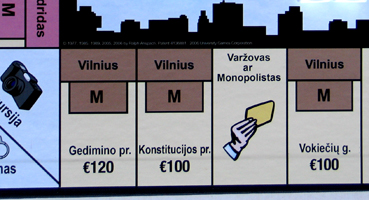 Roma: Corso Impero - Varžovas
ar Monopolistas - Via Roma - Pajamų mokestis (Income
Tax) Roma: Corso Impero - Varžovas
ar Monopolistas - Via Roma - Pajamų mokestis (Income
Tax)
Vilnius: Vokiečių g. - Varžovas
ar Monopolistas -
Konstitucijos pr. - Gedimino pr.
Ekskursija/Kaių mūšis(price war)/Kaléjimas
(Jail)
Madridas: Plaza Mayor - Elektros tinklai (Electric
Company) - Gran Via - Paseo de la
Castellana
Amsterdamas: Dam - Varžovas
ar Monopolistas - Leidsestraat - Kalverstraat
Anti-Monopolio fondas (Anti-Monopoly foundation)
Paryžius: Rue
la Fayette -Varžovas
ar Monopolistas - Rue de la Paix -
Champs-Élysées
Briuselis: Grote Markt - Hoogstraat -
Dujotiekis (Gas company) -
Nieuwstraat
Monopolistai: eikite į kainų Kaléjimo
lauką (Monopolist: Go to Jail) /
Varžovai:
eikite į kainų mūšio lauką (Competitor:
Go to the price war)
Londonas:
Park Lane - Piccadilly -Varžovas
ar Monopolistas - Oxford Street
Atėnai: Varžovas
ar Monopolistas - La Plaka - Turto mokestis (Property
tax) - Syntagma
The 4 spaces in the middle of each side are respectively: Avia kompanija -
Tramvajų kompanija - Geležinkelio
kompanija and Autobus.
The 3 corner spaces clearly have different meaning for the Monopolists and the
Competitors.
Note that in this Lithuanian edition the capital Vilnius is added as
second group of streets. The same is done in the other Baltic editions!
The bottom part of the box contains a white cardboard insert foulded such
a way that a lower part between two platforms can be used as bankers' tray and
store for the houses and hotels.
There are no Chance- nor Community Chest cards in this game but 2x25
plain, white cards Monopolistai and Varžovai
instead, all with funny illustrations and always with detailed comment, like:
On the Varžovai
cards:
 | Kongresas pagaliau paskyrč pakankamai pinigų Antimonopoliniam.
Skyriui efektyviam antimonopolinių istatymu
pričmimui. GAUNATE po 25 €
iš kiekvieno monopolisto. =
Congress has finally given the Antitrust Division enough money to enforce
the Anti-Monopolist laws effectively. COLLECT 25 € from each
Monopolist.
|
 | Jus pradedate naują verslą?
Ar jis klestčs? MESKITE KAULIUKĄ! Jei išmetate 9 ar mažiau - JIS ŽLUNGA.
Jei išmetate 10 ar daugiau - iš
iždininko GAUNATE 75 €. =
You are starting a new business. Will it succeed? THROW THE DICE! If you
get a 9 or less IT FAILS. If you get 10 or more COLLECT € 75
from
treasurer.
|
 | Energetikos monopolistai pakčlé naftos kainas. Jūs pakeliate nuomos
kainas savo nuomininkams, kad išliktumčte konkurencinčje kovoje.
MOKATE 50
€ iždininkui. =
The Energy Monopolists have jacked up the price of heating oil.
Competition keeps you from passing on the whole increase to your tenants.
PAY 50 € to treasurer. |
On the Monopolistai cards: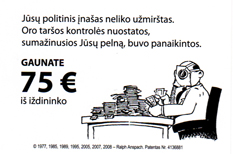
 | Jūsų politinis inašas neliko užmirštas. Oro taršos
kontrolés nuostatos, sumažinusios Jūsų
pelną, buvo panaikintos.
GAUNATE 75 € iš iždininko. =
Your political contribution was not forgotten. The smoke pollution
controls which cut down on your profits have
been abolished. COLLECT 75 €
from the treasurer.
|
 | Vieno abejotino sandério metu iš Vyriausybés gavote atsakymą Jums palankaus
kontrakto pričmimui. Bet kažkas
perdavé šią informaciją spaudai. Sužinoti, ar
Jūsų sandéris praslys, meskite kauliuką.
Jei išmetate - 7 ar mažiau - SANDÉRIS BUS NESÉKMINGAS, 8 ar daugiau - audra praeis
pro šalį ir Jūs
GAUNATE 75 € iš iždininko. =
Through a shady deal, you landed a big government contract. But someone
spilled the beans to the press. To
see whether your deal will go through,
roll the dice. If you get 7 or less NO DEAL, 8 or more the storm blew over
and you COLLECT 75 € from treasurer.
|
 | Neteiséta parama, kurią suteikéte senatoriui R.N. Abonentui jo kampanijos
metu per klaidą pateko Romui Nabonentui.
Tiesiog nesiginčykite ir
MOKATE baudą - 50 € iždininkui. =
An illegal campaign contribution you made to senator R.N.Ader went by
mistake to Ralph Nader. Just plead no
contest and PAY a fine of 50 € to
treasurer.
|
It is of course also necessary the two types of players to be taken into
account of on the property deeds. That is why they have 2 columns
for the prices: at the left for the Varžovams
and at the right side those for the Monopolistams.
The back side of the cards is also to show the property to be mortgaged. In this
situation the card must be given the bank, however, the owner can any
moment buy it back from the bank. This is also said on the back side of the
cards.
There are only 6 banknotes, printed in grey
on colored paper, in the denominations: 1
- 5 - 10
- 50 - 100
and 500.
There are only 6 plastic tokens, viz. of each a green
and blue one: cone, pyramid and a pawn like a "cilinder
with sphere".
The set goes with 35 houses and 15
hotels of plastic, with roof rim and chimney. (Note:
The Varžovai
must place their houses and/or hotels on the name of the field, while the
Monopolistai must situate them on the "H"-spot.)
Both dice are white with black pips.
The first version of this 21st edition was published in 2005 in
the USA, soon followed by that of many European countries.
This edition was "Made in Spain".
The price of this edition was at the introduction €
19.95.
|